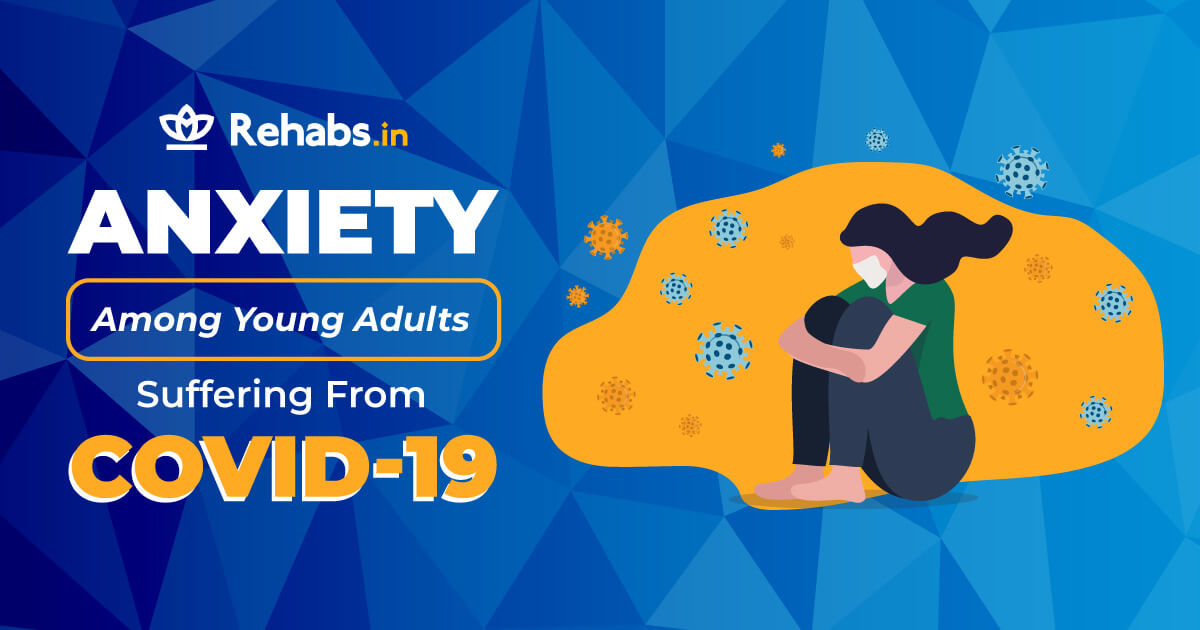Anxiety Among Young Adults Suffering From Covid-19

The following blog has been reviewed by a Psychologist. If you are reading the blog on a mobile phone, you can see the reviewer’s profile at the end of the blog. Please see our editorial policy here.
Out of the many repercussions of COVID-19, the least attention is given to those relating to psychology. Individuals who were diagnosed and have recovered may suffer from a psychological illness known as PTSD (Post-Traumatic Stress Disorder) for many months to come until it is diagnosed and eventually treated. Even the majority of people who have only seen others suffer from the virus are often finding themselves in a similar mental state. Young adults, in particular, are developing anxiety and stress as COVID-19 becomes the cause of their collapsing dreams while they sit at home in fear to keep themselves and others safe.
The stigma around Coronavirus due to lack of knowledge and awareness is more powerful than the disease itself. With social isolation, young adults are finding themselves in the middle of a major mental health crisis that had subsumed earlier. Stigma is also extended to a certain person’s community, population, and even nationality. A person who recovered from the disease is also not spared the agony. Since most of the young adult generation has been staying away from their parental homes due to their education and jobs, social isolation has taken a toll on their mental health.
Browse: List of Covid-19 Ready Rehab Centres
Effect of Social Isolation on Young Adults
Lately, young adults have been feeling the emotional pinch of the pandemic, leading to a change in usual behavioural patterns. It includes anxiety, depression, and stress. This social isolation may be causing an innumerable amount of young adults to resort to consuming drugs, alcohol or prescription drugs as a coping mechanism. Other factors adding to their anxiety are loss of jobs or poor financial status and emotional and physical abuse from or of partners.
While on the outside, COVID-19 might look like it is not affecting the young adult generation as much as the adults or seniors, it has different repercussions. Fear and anxiety have become overwhelming, stirring a rush of other emotions. As per a survey conducted on young adults below the age of 25 in the UK, it was observed that 26% of the total participants were unable to access mental health services due to the lockdown and isolation. While social media made it easy to stay in contact with near and dear ones, its excessive use caused ill-effects too.
A National Survey conducted in the USA suggests that the SARS-CoV-2 pandemic has influenced young adults’ loneliness, revealing “significant depressive symptoms” in over 80% of the participants. It also revealed an alarming rate of mental health issues where 45% of participants faced moderate anxiety and 15% had severe anxiety issues.
Meanwhile, 30% of the participants also disclosed their harmful consumption of alcohol, and 38% consuming drugs in excessive quantities.
The convergence of COVID-19 and social isolation may be here to stay for a while or until there is some assurance of an alternative perspective. Therefore, addressing mental health problems due to social isolation before and after COVID-19 has become crucial. As 49% of participants of the National Survey in the USA suffered from severe degrees of loneliness, most of them also resorted to alcohol and drug use for coping.
Social isolation, which draws an individual from using community resources, can also help improve personal and mental well-being by encouraging developing bonds with other people of interest.
Addressing Social Stigma Around COVID-19 and Its Patients
The stigma around COVID-19 stems from the fact that most of its information is still unknown to the common masses other than it being a fatal virus. While scientists and various medical professionals are still studying its origin and cause of rapid escalation, the knowledge is rare to humankind. The fear of the unknown has only been overwhelming. The pattern of stigmatising the disease has remained similar for all other fatal diseases whose origin and contraction still remains unknown.
The outbreak of SARS-CoV-2 has only provoked social stigma and relative discriminatory behaviour, especially against people who have suffered from the disease. It also extends to the people who are believed to have come in contact with the infected person.
The level of social stigma relating to this virus is majorly based on the following factors:
- SARS-CoV-2 still remains unknown (even though there have been developments in its vaccine)
- Humankind has always been afraid of the unknown (be it natural or superficial)
- Fear is easy to associate with other people
- Self-isolation creates panic among the masses
Social stigma relating to public health emergencies has always been stressful for people of all kinds and communities. The developed discriminatory behaviour can lead to negative effects, especially on people suffering from the disease. In severe cases, it can also extend to the patient’s family, caregivers, and communities.
Social stigma may:
- Prevent people from seeking appropriate healthcare services, specifically in cases of emergency (further leading to its spread)
- Drive people to hide its prevalence because of its negative portrayal
- Dishearten people from adopting healthy behaviours
- Cause lack of enthusiasm among health workers
- Hurt people emotionally by creating a fear paradox
The discrimination because of the social stigma may take the form of rejection, physical and mental abuse, and in rare cases, violence.
Mental Health Issues Faced By Young Adults
Social isolation is the non-existence of social or in-person contact with others. While a person may become socially isolated due to various reasons like disabilities, financial irregularities, or mental or physical illness, COVID-19 has only escalated it. The social isolation for young adults has taken the shape of various mental health issues.
Some of the mental health issues faced by young adults are:
- Alleviated anxiety
- Depression
- Severe stress
- Self-harm or suicidal behaviour
- Drug and alcohol abuse
- Increased level of loneliness
- Insomnia
- Obsessive compulsive disorder (OCD)
- Psychosomatic disorders (disease relating to both mind and body)
While these mental health issues are for a usually healthy person, the effects of novel coronavirus may range in higher degrees for people having pre-existing health conditions.
How To Cope With COVID-19 Related Mental Health Issues?
Many studies show evidence that the stigma related to any communicable disease hampers a human’s bodily response for a better recovery. Building proper communication channels and keeping a healthy outlook, however, helps cure the disease faster. Also, reliable health services and advice from professionals, empathising with the patients, adopting safety measures may help keep self and others safe.
Communication is critical in combating the disease and stating facts than stigma only helps. A trusting environment can be created, especially for young adults dealing with its mental health consequences, to address it in the open.
Here are some tips to follow:
- Talk about COVID-19 as it is without relating it to a particular community or geography
- Know how the disease can be contracted (avoid the labels)
- Speak accurately based on scientific data or medical studies (do not spread myths or rumours)
- Emphasise on adopting preventive measures rather than criticising or belittling its patients
- Spread recovery stories
- Show diverse communities taking part in the drive for the betterment of humankind
- Emphasis on COVID-19 vaccine and treatments
- Do not stereotype
- Use influential resources to spread awareness
- Offer love and care to the patients of novel coronavirus
- Sympathise with people who are recovering or have done already
- Do not spread fear
- Choose careful and non biased words for spreading relevant information
For young adults living with family, the hardest part may be the absence of privacy and space. Such individuals, in this age, generally work towards being independent and exploring the world on their terms. While they may feel stuck in the isolated world, love and support can help them relieve anxiety.
Taking Steps In the Right Direction
To counteract the effects of social isolation in young adults due to COVID-19, help can be given by adults in the family or from outside sources such as psychiatry professionals and Counseling Psychologists. The antidote to anxiety is love, care, and communication.
While they may get cured of COVID-19, well-being at home still remains a primary concern. If a young adult is displaying symptoms of depression or anxiety at home, do not hesitate to get professional help. It is only a step in the right direction.
These are challenging times. Not only young adults, but every individual living on our planet needs love and kindness to overcome this pandemic.
Sources
https://www.ncbi.nlm.nih.gov/pmc/articles/PMC7444649/
https://www.sciencedaily.com/releases/2020/11/201116112918.htm
https://www.who.int/docs/default-source/coronaviruse/covid19-stigma-guide.pdf














